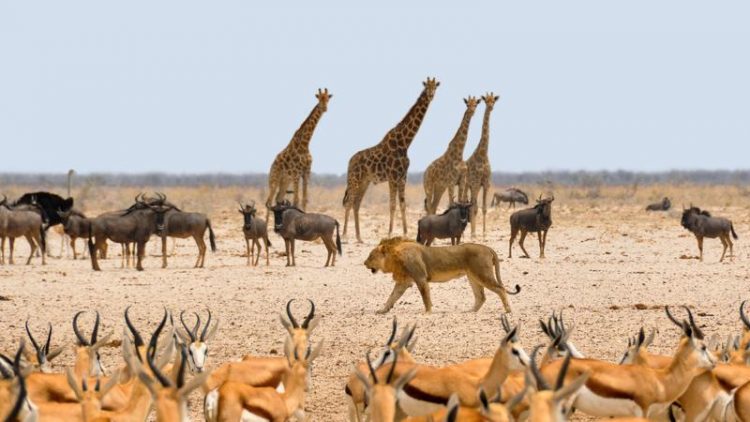Dry landscapes can increase disease transmission

Dry landscapes can increase disease transmission Pixabay
Sick individuals often behave differently. For example, they usually sleep more and eat less. Accordingly, one could expect that sick individuals have less contact with others than healthy individuals. Reduced contact should in turn slow down the spread of pathogens among individuals.
“We studied whether the opposite effect is also possible, i.e. whether sick individuals may have more contact with others, which could speed up the spread of pathogens,” explains Mathias Franz, research scientist at the Leibniz-IZW.
“For this purpose we simulated a population of virtual animals living in dry landscapes in which they regularly visit a single waterhole for drinking. We observed that sick individuals, who we assumed to be more lethargic, stayed closer to the waterhole. Because healthy individuals also visit the waterhole regularly, we found that lethargy leads to an increase in encounters between sick and healthy individuals”.
The results of the study show that the resulting increase in contact can therefore speed up the spread of pathogens.
The study shows that dry landscapes can change how sickness influences host behaviour in unexpected ways: instead of reducing contact and the spread of pathogens, sickness behaviour might lead to an increase in contact and pathogen transmission.
Based on this finding, the prediction is that the availability of drinking water can have far-reaching implications for the spread and evolution of pathogens. Specifically, the scientists hypothesize that the effect of sickness on behaviour is most pronounced in animals that are very dependent on regular access to limited drinking water – or any other limited resource.
This is for example the case for African buffaloes, which harbour important infectious diseases such as bovine tuberculosis. In conclusion, understanding how sickness affects behaviour could help predicting and controlling disease transmission within wildlife and between wildlife and domestic animals.
Publication:
Franz M, Kramer-Schadt S, Greenwood AD, Courtiol A (2018): Sickness-induced lethargy can increase host contact rates and pathogen spread in water-limited landscapes. Functional Ecology. Doi.10.1111/1365-2435.13149. https://besjournals.onlinelibrary.wiley.com/doi/10.1111/1365-2435.13149
Contact:
Leibniz Institute for Zoo and Wildlife Research (IZW)
in the Forschungsverbund Berlin e.V.
Alfred-Kowalke-Str. 17
10315 Berlin
Germany
Dr Mathias Franz
Phone +49 30 5168-251
Email franz@izw-berlin.de
Steven Seet (Press Officer)
Phone +49 30 5168-125
Email seet@izw-berlin.de
https://besjournals.onlinelibrary.wiley.com/doi/10.1111/1365-2435.13149
Media Contact
More Information:
http://www.fv-berlin.deAll latest news from the category: Ecology, The Environment and Conservation
This complex theme deals primarily with interactions between organisms and the environmental factors that impact them, but to a greater extent between individual inanimate environmental factors.
innovations-report offers informative reports and articles on topics such as climate protection, landscape conservation, ecological systems, wildlife and nature parks and ecosystem efficiency and balance.
Newest articles

Sea slugs inspire highly stretchable biomedical sensor
USC Viterbi School of Engineering researcher Hangbo Zhao presents findings on highly stretchable and customizable microneedles for application in fields including neuroscience, tissue engineering, and wearable bioelectronics. The revolution in…

Twisting and binding matter waves with photons in a cavity
Precisely measuring the energy states of individual atoms has been a historical challenge for physicists due to atomic recoil. When an atom interacts with a photon, the atom “recoils” in…

Nanotubes, nanoparticles, and antibodies detect tiny amounts of fentanyl
New sensor is six orders of magnitude more sensitive than the next best thing. A research team at Pitt led by Alexander Star, a chemistry professor in the Kenneth P. Dietrich…





















